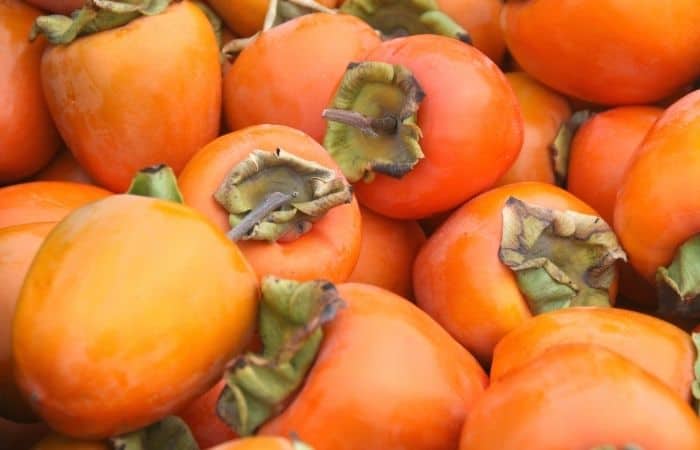Yes, parrots can eat persimmons without any health risks. In fact, wild parrots love to consume persimmons regularly, so can your pet bird. But make sure to buy only ripe permissions to feed your pet.
This fruit is available in different sizes and colors, i.e., orange and dark red to light yellow. The fruit’s silky-smooth texture and unique flavor profile can attract anyone, even birds.
Its taste is a blend of mango, cinnamon, and roasted sweet pepper. Thus, parrots enjoy nibbling on this tasty fruit.
Can Parrots Eat Unripe Persimmons?
No, unripe persimmons are not safe for parrots because of the high level of tannins content found in them. The fruit will also be unpleasant and sharp in taste at this stage.
There can be varied health risks for parrots if they consume an unripened persimmon. The signs include:
- Closed eyes
- Less mobility
- Diarrhea
- Weight loss
- Breathlessness and open beak
- Decreased or increased appetite
- More water intake
So do not consider feeding your parrot persimmons when raw. Since tannins are toxic, you need to keep your pets away from the unripened fruit.
But the tannins content reduces when the fruit ripes. Eventually, you will notice its flesh becomes pulpy, soft, and sweet. To identify riped persimmons at the nearby grocery store, make sure youonly pick bright orange-colored persimmons for your pet.
How to feed persimmons to parrots?
If you’re having a hard time feeding your pet persimmon, the simplest way to feed the fussy birds is not to give up. Keep putting the fruit repeatedly inside the parrot’s cage until it gets accustomed to its taste. You can also consider hanging persimmons directly on their cage to grab their attention.
Follow these tips when you are planning to feed persimmon for your parrot.
- Always pick the plump fruit that has smooth, bright orange skin. Also, there will be no cracks on the skin.
- Don’t forget to store the ripened persimmon in the fridge.
- You can feed riped persimmon within a day or two of purchase.
- If you have bought unripe persimmons, keep them at room temperature and let them ripe for a couple of days.
- To accelerate the ripening time, place them in a paper bag with an apple. The ethylene gas released from apples quickens the ripening process for persimmons.
- Besides, there is no need to cook or steam the fruit. Simply chop and serve the persimmons in small sizes. Peeling is optional.
- However, you can also experiment by feeding your picky parrots in a fun way. So scoop out and purée the pulp to make a delicious smoothie or sauce. Serve it to your pet.
What are the different varieties of persimmons?
You will find two main types of persimmons in the market. It includes Fuyu persimmons and Hachiya persimmons.
Fuyu:
Fuyu is a famous squat-shaped non-astringent species of fruit commercially grown in California, USA. Resembling the shape of flattened tomatoes, this type of persimmon has a firm texture. The fruit is palatable to eat when it turns a little soft. However, you can even eat them when firm.
Hachiya:
On the other hand, Hachiya is an astringent species from Japan with a distinctive thin acorn shape. They arefirm and immature with deep orange skins. The high amount of tannins makes them astringent and unfit food for birds. This toxicity reduces when the fruit ripens. Its flesh turns sweet, soft, and juicy with a jelly-like texture when fully ripened.
Even though both fruits species are rich in tannins, the Fuyu type loses tannins quicker than the Hachiya persimmon. Thus, Fuyu is the most common and safest variety of persimmon to feed your pet parrot. It is recommended to only go with Hachiya species of fruit when they are completely ripe and squishy to eat.
What is the nutrition profile of persimmon fruit?
Persimmon is a type of berry plucked from the trees called Diospyros. This fruit is rich in vitamins, minerals, fiber, and antioxidants. So there are many nutritional benefits when you add this fruit to your pet’s meal plan.
Here are the essential nutritional values of the edible persimmon fruit.
Carbohydrates
Your pet needs a daily source of energy to stay active. Thus, persimmons can be an excellent option for your parrot as they contain 31 grams of carbs. But ensure to include the portion based on your bird’s fat levels.
Vitamin A
Rich in fat-soluble vitamin A, the fruit can improve vision and fetal growth.
Vitamin C
Vitamin C content in persimmons will act as an immunity booster for your pet. Also, it can support bone structure and strengthen muscles.
Antioxidants
Antioxidants found in persimmons can help prevent chronic diseases by reducing oxidative stress.
Folate
Folate presence will do wonders for the healthy growth of your pet’s feathers.
Fiber
Like any other fruit, persimmon also has a high level of dietary fiber. Thus, the fruit stimulates the digestive system while alleviating symptoms of diarrhea and constipation.
Minerals
This small fruit is a repository of essential minerals. The presence of calcium, phosphorous, and magnesium makes them good for bones and joints. The persimmons also contain iron that promotes red blood cell circulation and synthesis. Further, manganese content helps in healthy nerve functioning.
Conclusion
Fruits are a healthy and tasty meal for parrots. So you should not think twice – can parrots eat persimmons. Feed some ripe and juicy persimmons to your feathery pet today. The sweet, rich, and sharp flavor of these edible fruit makes them an excellent treat for parrots. It may become their favorite fruit due to sweet tang and a good blend of crunch to its taste.
